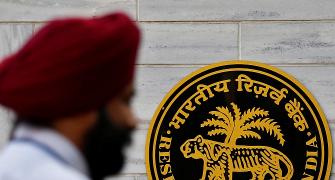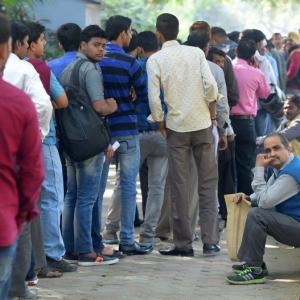'There is no difference between the earlier government and the present government.'
'They are all following the economic policy based on the Chicago School of thought.'
'This school of thought says the government should have very little role in governing the country and the majority of work should be handed over to the private sector.'
'This has not succeeded in the US.'
'Yet, it is being tried here by people like Arvind Subramaniam, Arvind Panagariya, Urjit Patel and Raghuram Rajan.'
'These economists want to reduce interest rates so that they can help the corporates.'
'They want to give loans to corporates at a lesser rate of interest.'
'And these corporates are the one who are hitting the banks.'
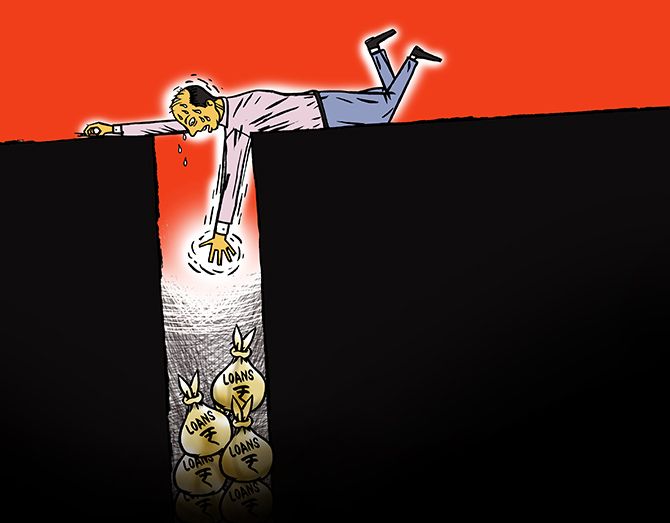
Illustration: Dominic Xavier/Rediff.com
Reports say the non-performing assets of Indian banks have risen from Rs 261,843 crores to Rs 614,872 crores -- by 135 per cent -- in the last two years.
The NPAs, which constitute 11 per cent of the gross advances, have been the major worry for all public sector banks.
In May 2017, the government issued The Banking Regulation (Amendment) Ordinance, 2017 which inserts provisions in the Banking Regulation Act, 1949, to handle cases related to stressed assets (stressed assets are loan accounts where the borrower has defaulted in debt repayment or where the repayment schedule has been restructured).
Is the banking sector happy with the Ordinance?
D Thomas Franco, general secretary, Bank Officers Confederation, tells Rediff.com's Shobha Warrier what ails India's banking sector.
Last year, when public sector banks declared their quarterly results, there was panic. Observers said the banking sector was in a mess. Do you think the mess continues?
The assessment that the banking industry is in a mess is not correct. Only a few corporate accounts have gone bad.
The NPA phenomenon is not new. From the day banking started, there have been non- performing assets.
The problem this time is that the accounts which have gone bad are huge corporate accounts.
They have not become NPAs because of the banking sector, but because of the problem in the economy. This was pointed out by the Parliamentary Standing Committee on finance.
Sometime ago, the RBI removed the ceiling on the advance that could be given to corporates.
Earlier, there was a limit and there was the Credit Authorisation Scheme under which the RBI had to give authorisation to for loans above Rs 1 crore.
Today, we lend to corporates without any limit. Of course, a consortium of 4 to 5 banks get involved.
Just because of the NPAs, you can't say that the banking sector is in a mess. Yes, there is a strain and it can be corrected.

The NPA problem, to a large extent, is confined to some 50 large defaulters.
Last year, when I interviewed a former banker, he said most of these are not wilful defaulters.
After the economy -- and the infrastructure sector in particular -- suffered, they were not able to pay.
Do you agree?
(Franco, left) Yes, many of them are not wilful defaulters.
Take Bhushan Steel, a large defaulter, for example. They are in trouble because of the problem related to steel.
When Chinese steel started coming in, our people could not compete with them. It affected the Indian steel industry badly.
But there are many wilful defaulters like Vijay Mallya as well.
If you look at the large accounts that have become NPAs, you will see that many of them are from the infrastructure sector. These companies could not do well because of the slowdown in the economy.
What we are saying is the corrective steps that were taken for Anil Ambani should be taken for others also.
Whom do you hold responsible for the fact that the NPAs have reached a level of Rs 6 lakh crore?
Do you feel the RBI as the regulatory body should have intervened long ago?
Both the Reserve Bank of India and the government are responsible.
It is not that they were not aware.
We were periodically sending reports and the RBI was empowered to audit all the large-scale advances under Section 35A, which they have been doing all along.
The prudential norms of the NPA are given by the RBI and all banks have followed them.
When the loans were given to these corporate houses, an RBI director was there on the board of the PSU banks. A finance ministry representative was there as well.
So, it is not that the bankers made these decisions on their own.
All these advances were given with the approval of the board, of which the RBI and the finance ministry is a part.
Since they were aware of what was happening, they should have taken effective steps earlier.
You mean, they should have intervened and not allowed the NPAs to reach this level.
Yes. For example, the Parliamentary Standing Committee on finance has given clear recommendations.
One thing they have suggested, which nobody talks about, is that these infrastructure loans would have helped the economy to grow if everything went well.
So, you cannot blame the bankers or even the companies. These companies could not foresee what was coming.
When those working in the power sector were about to produce power, the cost of production had gone up due to various extraneous factors.
As they were not able to produce power and hence not repay the loan, their accounts have been declared as NPA.
You have to find some ways to rectify the problem as you have done in the case of Adani.
In his case, when the power production started, they said the cost of production had gone up and they wanted to revise the agreement, and the government revised the agreement.
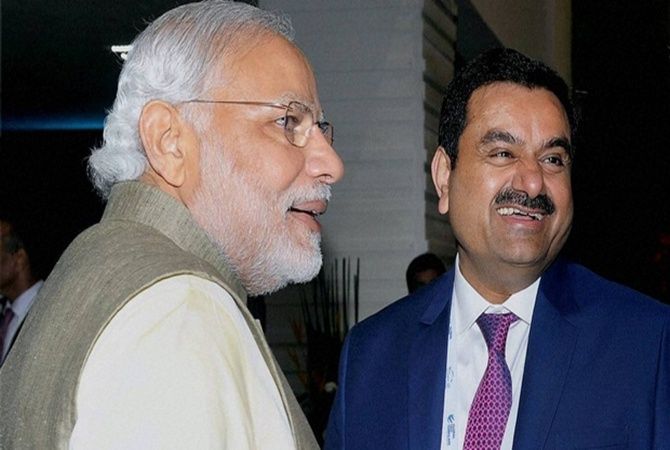
Do you feel there is a different set of rules for different businessmen?
Definitely, there are different rules for all the corporates. There is no doubt about it.
In the case of Anil Ambani, Reliance Defence asked IDBI to convert their loan into long-term credit.
This is the recommendation that the Standing Committee had given in February 2016.
It had suggested that the Industrial Finance Corporation, which is an arm of the government that was created to support the industry and infrastructure, take over all the infrastructure loans from the banking sector so that the banks' books become clean.
They can convert it into long-term credit and follow it up.
Do you feel the banking sector is under strain because almost 60 per cent of the system is under government control?
No, you can't say that.
In a country like ours, the moment the government loses control, only the large borrowers will get loans.
Small credits are not given by the private sector banks.
It is only these public sector banks that do these Jan Dhan, Mudra Lona, agricultural credit, etc.
So, it is necessary in a country that is still in a developing stage.
If you remove the control of the government, it will not be good for the country. But there should not be any interference.
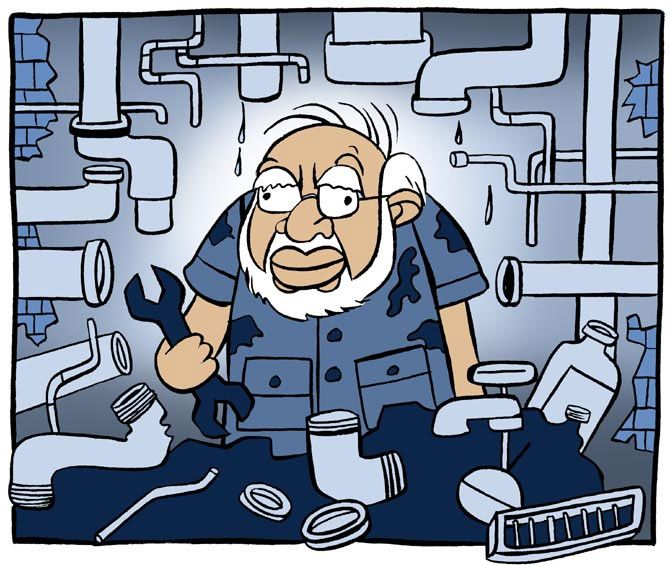
Illustration: Illustration: Uttam Ghosh/Rediff.com
Is political interference one of the reasons for the stress the banking sector is facing?
Yes, it is.
But political interference in a democratic country cannot be totally removed.
When the nationalisation of banks took place, the people who were appointed were experts and took care of the interests of the country.
Then came a period when they started bringing in people who have political connections.
The finance ministry started interfering in the selection of every chairman, managing director and other directors, and putting pressure on bankers for loans to certain sectors or individuals.
But this can be rectified within the government system itself, by giving autonomy to the boards of the banks.
Today, even the RBI is under political pressure.
Ever since the balance sheets of public sector banks showed red, there were talks of mergers, acquisitions and downsizing.
Are these the solutions to the problems banking sector face today?
Not at all.
What is the result of the merger of the associate banks with the State Bank of India?
For the first time in its history, the consolidated balance sheet of the SBI shows a loss of Rs 381 crores.
Secondly, there are problems related to human resources.
Basically, the banking sector in India developed region-wise and, if a particular bank is strong in a region, it is because it is rooted in the local culture.
If mergers were to succeed, they should have succeeded so well in the United States.
In the 2008 crisis, many of the big banks collapsed. The government had to intervene to restore them. Some survived while others went down.
Clearly, creating a big institution does not give any advantage.
The fact is, India is still under-banked.
If you compare the data with any developed or developing nation, or the BRIC countries, if the average bank per population there is 5,000, in India, it is more than 10,000.
We need more of the banking services to reach the interiors of the country. That can happen only when there are multiple players.
So, by reducing the number of banks to five or six as mooted by Vinod Rai or those in the finance ministry, you are going to restrict banking activity.
By doing so, you are doing something contradictory to what is being promoted by the prime minister, the Jan Dhan Yojna.
On one side, you are opening small banks and asking the post office to start banking and, on the other, you want to reduce the number of pubic sector banks.
Is it not contradictory?
It is a very wrong step.
Was it a panic reaction?
No, it was not a panic reaction. It was a very well-planned move.
The fact is, there is no difference between the earlier government and the present government on this issue.
They are all following the economic policy based on the Chicago School of thought or the Milton Freidman School of thought.
These schools of thought say the government should have very little role in governing the country and the majority of the work should be handed over to the private sector.
This has not succeeded in the US. Yet, it is being tried here by people like Arvind Subramaniam, Arvind Panagariya, Urjit Patel and Raghuram Rajan as all of them belong to the same school of thought.
These mergers and consolidations are only a step towards privatisation.
The Swadeshi Jagran Manch says that none of these economists understand the real India.
I fully agree with (S) Gurumurthy and the Swadeshi Jagran Manch on this point. They (Western trained economists) are trying an economic policy that is not suited to this country.
India is a savings based economy, which is not the case in the US or Europe.
Here, you have to give more interest so that people save more.
Then, you will have more funds to give as credit, which will help the economy to grow.
But these economists want to reduce the interest rates so that they can help the corporates.
They want to give loans to corporates at a lesser rate of interest. And these corporates are the one who are hitting the banks.
So, the entire direction has to change.
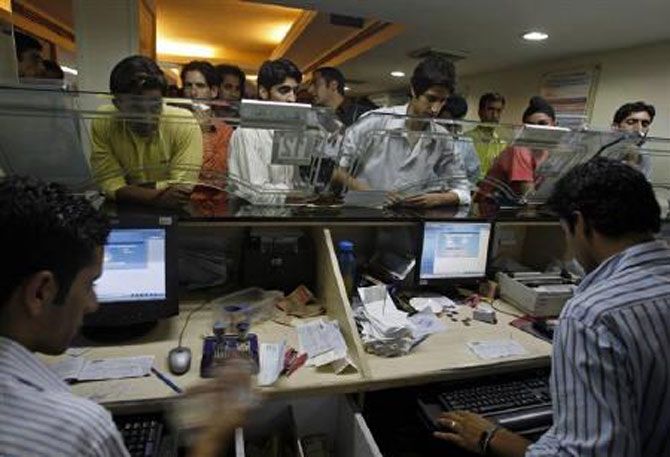
You mean downsizing and mergers are not the answer to the needs of the country?
Exactly. In fact, they have to move in the opposite direction.
Do you think the NPA problem started after liberalisation and has now reached gigantic proportions?
Yes, you are right.
Before liberalisation also, there were NPAs, but in small numbers and they belonged to small accounts.
If 100 accounts that had taken a loan of Rs 1 lakh defaulted, the amount only came up to Rs 1 crore.
Now, you give a loan of Rs 100 crore to one person. When he defaults, it is a huge burden on the bank.
Between 1991 and now, small credits have practically reduced and large credits have increased.
As of March 2016, 11,536 borrowers have got 36 per cent of the total loans given by the banking sector.
Whereas, in 1991, big loans were 10 per cent of the total loans.
As per the RBI data, the total number of borrowers as per March 2016 is only 16 crores which amounts to only 12 per cent of the 132 crore population of the country.
It shows there is a huge need for the outreach to the rural and semi-urban areas of the banking sector in this country, and this can be done only by public sector banks with larger expansion.
Under the new Ordinance issued by the government, the RBI can ask banks to initiate insolvency proceedings to recover bad loans. Is it a good idea?
I do not think so.
Instead of doing this, they should have made the recovery laws stringent which is what was recommended by the Parliamentary Standing Committee.
Here, the government is giving an escape route for those with bad loans.
These borrowers have quite a lot of assets but, once you start insolvency proceedings, the assets will be sold at a low price.
The companies might have diverted the money to different companies by then, and this will give them a route to get out of the problem.
Insolvency is not the solution; they should bring in laws to recover the loans.
What is the idea behind such an Ordinance?
They are only helping the borrowers to get rid of the problem. They are not trying to help the banks to get rid of the problem.
What the government should have been doing is: Attach the personal assets of these borrowers because they are responsible for the crisis if the government is not.
If the government was responsible for the infrastructure problem, they should come to the rescue.
You said this Ordinance was like applying bandage to cancer when what was needed was surgery. What is the surgery you recommend?
Initiate criminal proceedings against wilful defaulters.
In the other cases, the personal assets of the owners of the companies should be attached so that they are held responsible for the decisions they have taken.
Third, as suggested by the Parliamentary Standing Committee, the government should assess the loans where the default is because of the policy of the government encouraging banks to lend to the infrastructure sector.
The government can give some relief in the form of long term credit instead of short term credit and provide adequate capital to the bank.
Are you hopeful of the banking sector coming out of the crisis soon?
Not if they follow the present policies. If there is a change in the policies, it is definitely possible.
Even in the so-called weak banks, deposits are growing, advances are growing, per employee profits are growing and even gross profits have grown in all the banks except in three.
What does it mean? That the banking sector in India is actually growing.
But the burden on the banks as NPAs created by the policies of various governments hasn't gone away.
On one side the government wants to reach every nook and corner of the country through Jan Dhan accounts and, on the other, they have policies to help the corporates.
Are these policies not creating parallel lines which can never meet?
Exactly. If they are going to continue with these kinds of policies, they will never meet.
At present, the policies are only to help the big corporates and not the banks.


